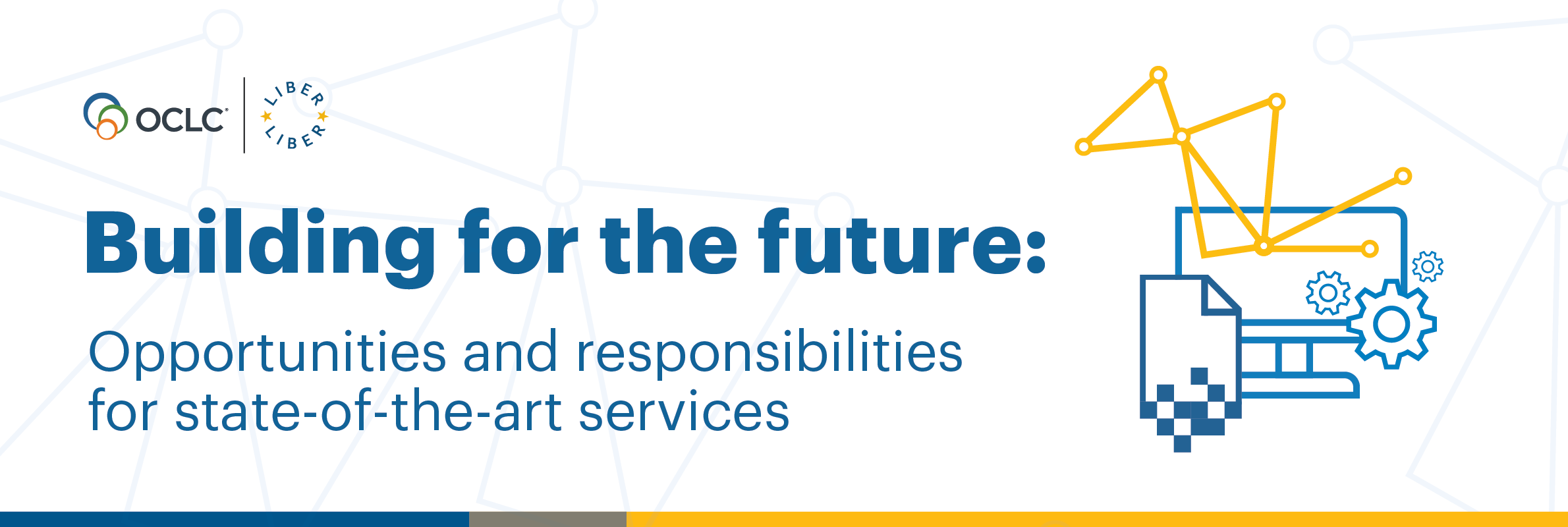

We are living in an era of unprecedented change. In this challenging environment, research libraries must respond to rapidly evolving technologies, a drive for open content, and the imperative of supporting rights and values. Collaboration is vital to leverage relationships, resources, and expertise to the greatest effect.
The OCLC-LIBER “Building for the future” programme is a multi-year engagement series based on LIBER’s 2023-2027 strategy, which presents a vision for the future of research libraries. LIBER and OCLC will host a series of discussions to collectively examine, explore, and ideate around the impacts of the aforementioned disruptions.
The 2023-2024 edition of the series will focus on state-of-the-art services:
“By 2027, research libraries will provide forward-looking, state-of-the-art services for collections, publishing, and curation of information and (meta-)data. These services will be relevant to and tailored for user groups inside and outside academia.” (LIBER Strategy 2023-2027)
The discussion series will run from October 2023 through June 2024, and the conversations will focus on the opportunities for strategic library collaboration around these three topical areas:
We invite LIBER and OCLC Research Library Partnership affiliates–along with the broader research library community–to join us for this opportunity to learn, reflect, and ideate a shared vision for libraries.
About the event organisers:
LIBER (Ligue des Bibliothèques Européennes de Recherche – Association of European Research Libraries) is the voice of Europe’s research library community. More than 420 national, university and other libraries are part of LIBER and our wider network includes goal-oriented partnerships with other organisations in Europe and beyond.
OCLC is a global library organization that provides shared technology services, original research, and community programs for its membership and the library community at large.
The series will consist of five sessions taking place between October 2023 and June 2024:
We invite the global library community to attend both plenary sessions.
LIBER members and OCLC Research Library Partnership affiliates will receive priority registration for the facilitated discussion sessions.
Participants will leave this series with:
You will need to register separately for each session you want to attend, using the links below.
Thursday 12 October at 15:00 (CEST) / 14:00 (BST) (Duration: 75 minutes)
Courtney C. Mumma, MAS/MLIS, Deputy Director of the Texas Digital Library consortium; Thomas Padilla, Deputy Director, Archiving and Data Services, Internet Archive; and Saskia Scheltjens, Head of Research Services, Rijksmuseum.
LIBER and OCLC Research representatives will introduce the theme and a panel of thought leaders will set the scene for the discussions.
Watch the recording View Saskia Scheltjen's slides
View Courtney Mumma's slides View Thomas Padilla's slides
Courtney C. Mumma, MAS/MLIS, Deputy Director of the Texas Digital Library consortium
Courtney Mumma is an archivist, librarian, and the Deputy Director of the Texas Digital Library (TDL) consortium, where she provides leadership for many of TDL’s infrastructure services for Texas libraries, including the Texas Data Repository, Electronic Theses and Dissertations (ETDs), digital preservation services, and DPLA harvesting services. Courtney has also worked in web archiving at the Internet Archive and is one of the creators of the Archivematica open-source digital preservation workflow system.
Thomas Padilla, Deputy Director, Archiving and Data Services, Internet Archive
Thomas Padilla has over ten years of experience developing, consulting, publishing, presenting, and teaching about responsible computational use of cultural heritage collections, digital strategy, data literacy, digital scholarship, and data curation. He is the author of Responsible Operations: Data Science, Machine Learning, and AI in Libraries, published by OCLC Research in 2019.
Saskia Scheltjens, Head of Research Services, Rijksmuseum
Saskia Scheltjens, as Head of the Research Services department at the Rijksmuseum, provides leadership for the management of information and data about the museum’s collections and the organizations, including the Rijksmuseum research library. She has a background in both academic and museum libraries in the Netherlands and Belgium.
Wednesday 15 November 2023 at 14:30 (GMT) / 15:30 (CET) (Duration: 90 minutes)
FAIR is the new Open. This session will focus on the challenges and opportunities for collaboration in the provision of research data management services (RDM).
Wednesday 7 February 2024 at 14:30 (GMT) / 15:30 (CET) (Duration: 90 minutes)
Today we are awash in data. This session will focus on collaborative data-analytics informing library collection management, contract management and negotiations with publishers, research information management and data-driven decision making in other areas.
Wednesday 17 April 2024 at 14:30 (BST) / 15:30 (CEST) / 09:30 (EDT) / 06:30 (PDT) (Duration: 90 minutes)
The future is here. In this discussion, we will use our imaginations to consider how advancing technologies can improve library workflows, metadata, and more–while being attuned to the need for responsible operations.
Thursday 6 June 2024 at 14:00 (BST) / 15:00 (CEST) / 09:00 (EDT) / 06:00 (PDT) (Duration: 75 minutes)
Moderated panel discussion with Rachel Frick, Executive Director, Research Partnerships and Engagement, OCLC; Prof. Dr. Anna Petrus, Professor of Data Management, University of Applied Sciences of the Grisons; Amanda Rinehart, Life Sciences Librarian, The Ohio State University; and Dr. Peter Verhaar, Assistant Professor, Leiden University Centre for Arts and Society.
Libraries are navigating a complex landscape of emerging technologies and ever-growing quantities of data, impacting library operations, and transforming service offerings. Responding to these changes is critical, and between November 2023 and April 2024, OCLC and LIBER jointly convened three interactive discussion sessions to closely examine the opportunities and responsibilities libraries face in providing state-of-the-art services in this challenging environment.
The closing plenary session will offer key insights gleaned from these sessions, synthesized from the numerous small group discussions of transcontinental participants from the LIBER and OCLC Research Library Partnership (RLP) networks. A moderated panel of LIBER representatives will respond to this overview and reflect upon how these discussions can help research libraries collaboratively plan in these challenging times.